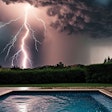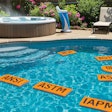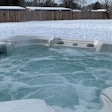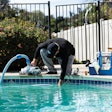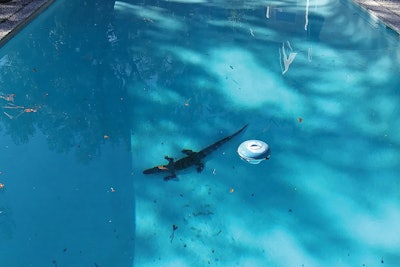
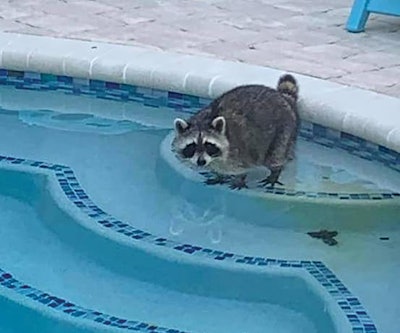 Photo courtesy Rob Estell
Photo courtesy Rob Estell
Service technicians take what the pool account gives them – crazy customers, sloppy bathers, amorous observers, whatever. Typically, their professional interactions are limited to humans, but sometimes, they walk into a customer's backyard and are "shocked" (chlorine pun intended) to find a new, furry friend inhabiting their workspace. There are a variety of reasons for this, some of them being drought, rural construction and blatant animal curiosity. But no matter the case, the wild animal must be removed from the premises in order for the service tech to properly maintain their customer's pool... unless you are Shannon Noser with Jeff's Pool & Spa Service.
"We had serviced this pool for years and never had any issues. And then, one day, this alligator just showed up and decided to make it his home," says Noser. "The owner would call the DNR to come out and remove the alligator and they would, but he would just keep coming back. It came to the point where the DNR was like, 'Look, we just can't help you anymore.'"
"When our team would go to service this pool, the gator would be in the shallow end, just living his best life in clear, sanitized water. We would work around him. He was only a juvenile, maybe 5 feet, but it was still intimidating, working around an alligator. While I vacuumed the shallow end, he would hang out in the deep end and vice versa — that was our relationship."
In Noser's case, the alligator turned out to be a harmless nuisance, just eating up a small portion of the pool's chlorine. However, sometimes it's worse. Sometimes they die in the pool or skimmer, leaving a rotting corpse, and sometimes they leave a brown calling card, which is actually a health hazard.
Among the worst offenders are raccoons, says pool chemistry icon Terry Arko, who notes that raccoon feces can contain worm eggs called Baylisascaris procyonis, which, when ingested by adults, children and pets, can cause severe neurological illnesses.
According to the CDC, Baylisascaris is a roundworm parasite that commonly infects raccoons all throughout the United States. Due to the infection, the raccoon's feces then carries the worm's eggs, which can resist chlorine and pass through filters due to their protective outer shell and minimalistic size. The infection isn't spread from person to person, but rather, if a person were to swallow contaminated pool water, the eggs would hatch into larvae in their intestine and travel all throughout their body, possibly affecting their organs and muscles.
Ingesting only a few eggs may cause few to no symptoms; however, ingesting a large number of eggs could lead to serious consequences such as nausea, tiredness, liver enlargement, loss of coordination, lack of attention to people and surroundings, loss of muscle control, blindness and in worst case scenarios, a coma.
Clearly, no one would wish these illnesses upon anyone, not even their arch pool nemesis. So, how then, can a service tech eliminate the risk of disease?
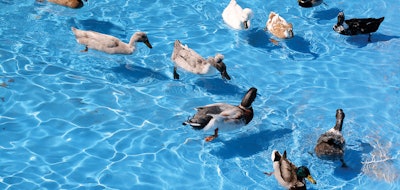
"If a raccoon has been in your customer's pool," Arko says, "regardless of their known bathroom usage, you should hyper chlorinate the pool at 40 ppm, keep it there for 24 hours, and then clean the filter by washing it with chlorine. But if it were me servicing the pool, I would probably drain it entirely and give all the equipment a thorough, chlorine wash to remain on the safe side of business."
The CDC states a way to proactively prevent raccoon feces is to eliminate all access to water; however, this advice isn't really feasible. A pool cover could certainly help, but why are raccoons attracted to pool water in the first place? Shannon Noser with Jeff's Pool & Spa Service had more to say on this topic, disputing common raccoon myths.
"A lot of people think raccoons are attracted to water because they like to wash their food, but that's incorrect. Raccoons have this protective coating on their paws and when it gets wet, it softens that coating and makes their paws super sensitive to whatever it is they are touching," says Noser. "So in the case of food, raccoons like to wet their paws and feel their food so they can memorize it and then find it again in the wild. It's an easy way for them to remember what they can, and like, to eat."
Meaning, raccoons are attracted to water so that they can wet their paws and remember their food, but we must remember basic animal physiology: What goes down an animal's throat must come out the back end. Eating near a swimming pool, and then using that same pool to relax, may find its natural result in contamination and serious consequences for the pool owner, unless dealt with and serviced properly.
Outside of alligators and raccoons, some other wild animals a service tech might encounter on the job are bears, snakes, rats, toads, ducks, geese and bats. Regardless of what type of animal is discovered to be swimming around, the concern is always the same: "Wild animals are wild animals. You have no idea what they've eaten, what they've gotten into, what other animals they have come into contact with.
"You just don't," says Arko. "Any wild animal getting into a customer's pool, especially of a substantial size, should be dealt with immediately and the pool should be, at a bare minimum, hyper-chlorinated."
Besides raccoons, the CDC also discusses the code-brown impact ducks and geese have on swimming pools. Specifically, bird droppings could contain significant germs like E. coli, Salmonella, Campylobacter and/ or Cryptosporidium (Crypto). Most of these germs are killed by a properly chlorinated pool in just minutes; however, Crypto is like Baylisascaris in that it has a tough outer shell, which allows it to survive in a swimming pool for days on end.
Crypto can be spread in many different ways, but drinking contaminated water is the most common, as it is a leading cause of waterborne disease among humans in the United States.
This article first appeared in the April 2023 issue of AQUA Magazine — the top resource for retailers, builders and service pros in the pool and spa industry. Subscriptions to the print magazine are free to all industry professionals. Click here to subscribe.






































